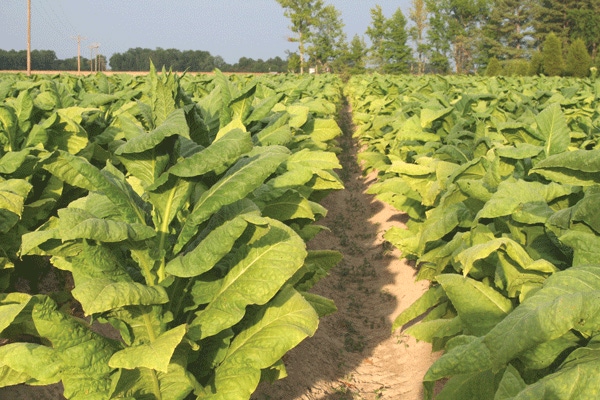
Has world declared war on U.S. burley tobacco?
• The new proposal, which is not specifically a ban on burley in cigarettes, but is instead a ban on additives, will be considered at a meeting of the World Health Organization (WHO) in mid-November in Uruguay. If it is adopted there or later, the 170 or so participating nations will be expected to enact it.• Adding insult to potential injury for farmers, there is little evidence the proposed rules would reduce cigarette consumption.• The leader of the world leaf growers organization questions whether the authors of these guidelines realize the economic effect they could have.
October 20, 2010

Unbelievable as it seems, an international health organization appears intent on taking action that could conceivably eliminate the use of burley tobacco in cigarettes overseas…and perhaps eventually in the United States.
The new proposal, which is not specifically a ban on burley in cigarettes, but is instead a ban on additives, will be considered at a meeting of the World Health Organization (WHO) in mid-November in Uruguay. If it is adopted there or later, the 170 or so participating nations will be expected to enact it.
That would include most of the world and could be very bad news for burley growers here, since nearly 75 percent of the burley produced in this country each year is exported.
There is one bright side: Such a ban would notbe enforced in the U.S., because this country does not participate in the WHO tobacco convention. But that might well only buy burley growers some time: The U.S. Food and Drug Administration (FDA) can be expected to take the cue to try to pass a similar ban, said Roger Quarles from Georgetown, Ky., a burley grower and president of the Burley Tobacco Growers Cooperative in Lexington, Ky.
“The World Health Organization is in a war against burley growers,” said Quarles. “If this thing comes to pass, it would be illegal to sell cigarettes that have any ingredient other than tobacco. That is what we are fearful of."
How could a ban on additives be a de facto ban on burley? Richie Farmer, commissioner of agriculture in Kentucky, explained earlier this year that burley tobacco takes on a harsh taste during the curing process.
“So manufacturers add flavors to make cigarettes made with burley more palatable to smokers,” he said. “A global ban on such additives would in effect eliminate the market for Kentucky-grown burley.”
Adding insult to potential injury for farmers, there is little evidence the proposed rules would reduce cigarette consumption.
“Foreign manufacturers would probably just shift to another variety of tobacco,” Commissioner Farmer said. “I do not believe that damaging Kentucky's economy in exchange for a negligible health benefit makes sense."
WHO proposal questioned
The WHO proposal is nothing more than “a blatant attempt to confuse the public and policymakers into believing that American-style cigarettes are somehow more attractive than non-blended cigarettes,” said Quarles. “This is patently untrue. Some consumers prefer blended cigarettes. Some prefer flue-cured products. Both blends taste like tobacco. Neither leaves a candy flavor or other characterizing taste with consumers.”
The leader of the world leaf growers organization questions whether the authors of these guidelines realize the economic effect they could have.
“One minute they tell you that with or without ingredients, all cigarettes are equally harmful,” said Antonio Abrunhosa, chief executive officer of the International Tobacco Growers Association. “Next, they go and ban one variety and not the other.”
An additive ban won’t stop people from smoking, he said. “All it will do is send the economies of countries that rely on burley tobacco export crashing — and with them — millions of farmers and workers whose livelihoods depend on growing tobacco.”
Abrunhosa, who wanted to attend the Uruguay meeting, but was turned away, is contemptuous of the WHO leadership. “These people should get on a plane and travel to Malawi and explain to 700,000 families that they’ve decided to make them grow potatoes instead of tobacco,” he said.
His organization has launched a drive to get growers around the world to sign a petition calling on governments to reject the WHO proposals.
“We aim to send out a very clear message to governments around the world that these guidelines are nothing more than a bureaucratic mess which will put the people who vote for them out on the streets,” said Quarles.
As bleak as the situation appears, there might still be a smaller place for burley in American cigarettes if additives are banned. Burley brings something to a cigarette besides absorbency. “If used very carefully, burley gives a blend a little more punch,” said one industry source. “It balances out the smoke delivery.”
The first American blend cigarette was the Camel brand, developed by chemists at R.J. Reynolds Tobacco and introduced in 1913. It contained flue-cured, burley, Oriental and a small amount of Southern Maryland, and the burley was included almost exclusively to absorb additives. Camel’s taste was considered milder than the popular cigarettes of the time, which were made of all flue-cured tobacco or all Oriental or a blend of the two. It was an instant success and attracted many imitators. Now, American blend cigarettes account for half the cigarettes sold worldwide.
What would American consumers smoke if additives were banned? There are several brands on the market now that are marketed as additive free, including the Winston brand from R.J. Reynolds and the Natural American Spirit brand made by Reynolds’ subsidiary Santa Fe Natural Tobacco Co. Spokesmen for both companies confirmed that both Winston and Natural American Spirit contain some burley.
There is at least one brand of cigarette on the U.S. market that contains only flue-cured. It is called Marlboro “Virginia Blend,” made by Philip Morris USA. But it is not marketed as being additive free.
Most cigarettes marketed in Canada and Great Britain are 100 percent flue-cured.
You May Also Like



